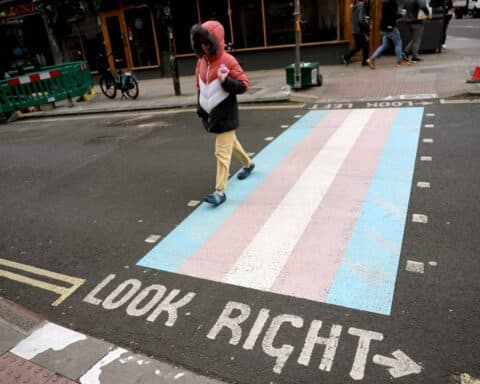Recently, my friend Elizabeth Scalia, wrote a wise and morally sensitive column about, on the one hand, her empathy with people who experience gender dysphoria and, on the other hand, her discomfort with Dylan Mulvaney and the commercialization of Mulvaney’s “performance art.” The former is demonstrated by Scalia’s friendship with a person named Sarah, who identified as transgender and who had a sincere and deep Christian faith, whom Scalia wrote about in a 2013 “First Things” article. The latter is illustrated by, among other things, Mulvaney’s TikTok series, “365 Days of Girlhood,” and the commercial success (I guess that’s the word) that followed it. Lest there be any possibility of an implication otherwise, I endorse every jot and tittle of both columns.
Scalia’s OSV News article is important for at least two reasons. First, she succinctly explains her own thoughtful consideration about transgender issues, providing a salutary template for our own thinking about them. Second, Scalia skillfully frames the broader issue of gender dysphoria and transgenderism, illustrating why these are such difficult issues, from doctrinal, pastoral, political and public policy perspectives.
This column is certainly not the place to fill out the frame. My purpose, rather, is to point out why Scalia’s justified discomfort with Mulvaney illustrates why it is so difficult for people like Sarah to be treated with the love and compassion that they are due. Mulvaney is an obstacle to a serious conversation, not its facilitator. As such, Mulvaney makes it difficult for the Sarahs of the world to find their place; and for us to find them amid the spectacle.
The groups that dominate the conversation
One difficulty of supporting people with gender dysphoria or who identify as transgender is that the space they occupy is dominated by other groups of people and ideologies that distort the issues beyond any reasonable hope of meaningful conversation. “Transgender” and “gender dysphoria” are used not simply to describe people like Sarah, but also a large and vocal group of activists who claim the labels for the purpose of advancing a moral and political agenda that metaphorically shouts over the Sarah’s of the world, and shouts down those of us who might sympathize with her, but recognize the deep moral challenges that that presents.
Put simply, there are people who struggle with gender identity, and there are gender charlatans who hurt the cause of the former. Dylan Mulvaney is the latter. “Identifying” as transgender, and thus protected by the moral force field of progressive secular morality and politics, Mulvaney has nothing in common with Scalia’s friend Sarah. Scalia describes Mulvaney “as a kind of giddy minstrel offering up the most harmful of female stereotypes for public consumption.” And she objects to the way Mulvaney has been able to exploit these caricatures into a financial windfall with the aid of Madison Avenue enablers. “Women who are offended by this need to be heard,” she concludes, no less than people with same sex attraction and gender dysphoria need to be heard.
A chasm which divides
But Scalia does not go quite far enough, nor account for the stark chasm between Mulvaney and those who struggle with sexual attraction and gender identity. Mulvaney is not a “transgender woman.” He is a misogynist man, exploiting a militant ideology for his own commercial gain. And in doing so, he is not simply reviving old gender stereotypes about women. Rather — and even more harmful — Mulvaney is preventing authentic debate about real issues of sexual attraction and gender identity that Scalia’s two columns so eloquently urge upon us.
Mulvaney has a stake in keeping people with authentic gender dysphoria closely identified with his brand of “transgenderism,” because it wins him the sympathy without the moral struggle. We cannot condemn his schtick as the misogyny that it is without also “condemning” the “community” to which he lays claim. And the voices of people with authentic, good-faith questions are drowned out by the noise.
A challenge for Catholics
The challenge Scalia puts before us Catholic Christians is to be loving and welcoming of persons with gender dysphoria and same-sex attraction. As she put it to me in a personal conversation, we must send a message that “wherever a person is on the journey to God, they are welcome in our pews.” To which I say, “Amen, sister.” This applies not only to people with gender dysphoria, but also to people who have “transitioned,” and to people with same-sex attraction. Not only should we welcome them when they come, we should go out and beckon them in. This is not to say that we chuck the Church’s moral teaching on sexuality and gender. In her “First Things” article, Scalia acknowledged that “this might mean challenges down the road, certainly, but first and foremost it would require an unambiguous welcome.”
But at least a significant impediment to her heartfelt and theologically sound admonition is that the pews are blocked more by the Dylan Mulvaney’s of the world than by sincere Catholic Christians trying to sort through the need for a loving pastoral response consistent with historic Catholic sexual morality. This is not to say that there are those who do not want Sarah in the pew. Certainly, there are. But for many Catholics, the difficulty of finding Sarah is that the Sarahs are being hidden by the Mulvaneys.
Kenneth Craycraft, an OSV columnist, is an associate professor of moral theology at Mount St. Mary’s Seminary and School of Theology in Cincinnati. Follow him on Twitter @krcraycraft.





